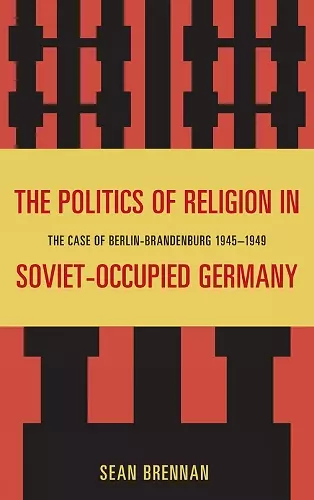The Politics of Religion in Soviet-Occupied Germany
The Case of Berlin-Brandenburg 1945–1949
Format:Hardback
Publisher:Bloomsbury Publishing PLC
Published:25th Nov '11
Currently unavailable, and unfortunately no date known when it will be back

This book discusses the religious policies of the Soviet military authorities and their allies in the Socialist Unity Party in the Soviet zone, but more importantly, who devised them, how they did so, and how they attempted to implement them. In doing so, it illustrates how the Soviet authorities recreated the Soviet zone along Stalinist lines with regards to religious policy, a process which they implemented throughout all of Eastern Europe as well in East Germany. While I examine how these policies were devised, I place greater emphasis on their implementation in the Soviet zone, especially its most important province, Berlin-Brandenburg. Furthermore, this book demonstrates how the leadership of the Churches responded to the policies of the Soviet military authorities and their allies in the Socialist Unity Party, especially after they took and increasingly anti-religious tone during the late 1940s. The diverse responses of the Church leadership in the Evangelical Church during the Soviet occupation reveal the foundations of the eventual break within the leadership of the Evangelical church in the 1960s over the issue of how to deal with the atheist SED-regime. At the same time, the stances of Evangelical Bishop Otto Dibelius and the Catholic Bishop Konrad von Preysing as stalwart opponents of the creation of the "second German dictatorship" in the 1940s demonstrate how Churches would become central actors in the East German dissident movement in the 1970s and 1980s.
This book, based on extensive archival research in Germany and the Russian Federation, is a solid contribution to the growing historiography on the Soviet occupation period in postwar eastern Germany. * Slavic Review *
[This book] provides a wealth of information on its narrow topic. * Lutheran Quarterly *
Brennan uses major archival collections of state and church provenance in Moscow, Berlin/Bonn, and Washington to provide multiple angles in documenting this crucial period of change. This book offers rich descriptive detail of the policy debates regarding the key issues in the church-state relationship. The Politics of Religion in Soviet-Occupied Germany makes a major contribution to the literature on church-state relations in eastern Europe and in Germany. -- Robert Goeckel, State University of New York, Geneseo
Based on extensive research in both German and Russian archives, Sean Brennan's book provides a unique perspective on relations between the churches and Communist authorities in the Soviet Occupied Zone of Germany. His detailed overview of the cat-and-mouse game that allowed the Communists to subdue their religious opponents deepens our understanding of those complex initial post-war years in Germany. -- Gary Bruce, University of Waterloo
Brennan blends the history of parties with diplomatic, education, and cultural history to reveal how both Catholic and Protestant organizations cooperated with, then questioned, then openly criticized, and finally resisted Soviet authorities and their German counterparts in the postwar period. A cleanly written history of a gray area, this book demonstrates more than just the details of religious policy or attitudes, but offers details about inter-group relations, watersheds in German history, and the phenomenon and influence of the Soviet Occupation. -- Elizabeth Morrow Clark, West Texas A&M University
ISBN: 9780739151259
Dimensions: 239mm x 162mm x 22mm
Weight: 549g
256 pages